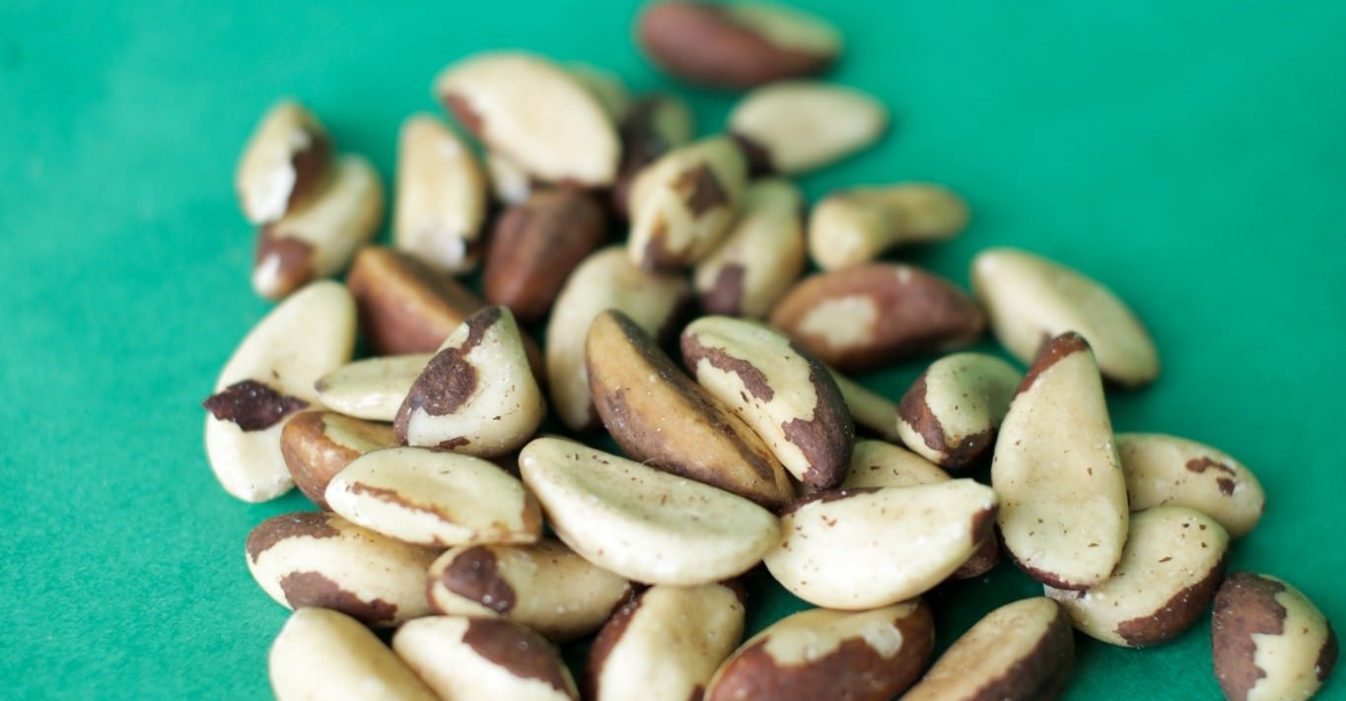Your thyroid is incredibly important to your everyday health — did you know that these foods can support thyroid health?
First things first, let’s break down the basics of why your thyroid is important, what it does, and the factors that can affect how well it works. It’s not that these foods are magic foods for thyroid health, but their nutrient profile and nutrients they provide your body is what’s most important and keep your thyroid functioning normally. You’re probably already eating a lot of them, here are 7 foods that support thyroid health.
Thyroid Health
The thyroid is basically your body’s silent workhorse — it releases the vital hormones that control your major bodily functions. This includes digestion, metabolism, heartbeat, temperature and how you use energy. When it’s not working correctly, you can gain unexplained weight, experience fatigue, feel anxious and more. (1)
According to the National Women’s Health Information Center, about 20 million people suffer from a thyroid disorder in the United States. You can tell that something is “off” with your thyroid when you experience issues like weight gain, depression, anxiety and you’re not sure why. Since the thyroid controls your body’s “thermostat” it directly affects appetite and energy, which both play a major role in how you feel every day.
Thyroid Disorders
Thyroid disorders can be tricky to diagnose with your doctor, and sometimes people have zero symptoms or signs that their thyroid is functioning abnormally. From Hashimoto’s (an autoimmune thyroid condition) to hyperthyroidism — when something’s going on with this butterfly-shaped gland at the base of the neck, someone could experience these thyroid disorders and common symptoms. In general, here are some things to learn about thyroid disorders:
Hypothyroidism — an underactive thyroid that doesn’t produce enough hormones (2)
- Unexplainable weight gain
- Digestive issues like bloating, constipation and gas
- Feeling cold all of the time
- Anxiety and unexplained moodiness
- Potential brain fog and weakened memory
- Feeling lethargic, lacking motivation and frequent feelings of fatigue
Hyperthyroidism — an overactive thyroid that produces too many hormones (3)
- Unexplained weight loss
- Diarrhea
- Experiencing insomnia
- Having chest pains
- Feeling anxiety and experiencing your heart racing
- Sweating a lot
Goiter — when the gland is abnormally large (4)
- Can be extremely large, but simple ones can be brought under control before this happens
- May cause difficulty breathing and swallowing
Thyroid Nodules — when a small lump is found in the gland (5)
- Typically, not noticeable
- Some nodules though may produce too much thyroid hormone and can cause hyperthyroidism
- Nodules that become too large can cause difficulty breathing or swallowing
Thyroid Cancer — cancer cells are found in the gland (6)
- Most thyroid nodules aren’t cancerous, but they should all be checked by a medical professional to rule this out
Hashimoto’s Thyroiditis — experiencing inflammation that’s reduced thyroid function (7)
- Fatigue
- Feeling cold
- Having a depressive mood
- Experiencing dry skin
- Having puffy eyes
- Feeling constipated
- Unexplained weight gain
- Slowed heart rate
- Joint and muscle pain and fatigue.
What Factors Affect Thyroid Health?
Your thyroid is affected by a slew of factors — ranging from genetics to your lifestyle habits, stress, environmental toxins, and your diet.
Diets that are deficient in iodine, selenium, and zinc are at-risk of thyroid issues. Additionally, poor gut health plays a part in causing imbalances, too.
Fortunately, you can control your diet, and that means filling up on foods that support strong thyroid health. Below, I’m sharing 7 easy additions you can easily incorporate into your diet today. As with all health challenges, each person has a unique makeup and everybody will differ with specific foods and lifestyle that’s the best for them and their health goals.
7 Foods That Support Thyroid Health
1. Seaweed
Seaweed is the rockstar here — just one dried sheet contains well above the daily recommended value of iodine, an important nutrient that the thyroid turns into thyroid hormones. (8)
2. Brazil Nuts
A handful or two of brazil nuts — about 6-7 nuts — can contain more than your daily recommended value of selenium. Studies have shown that selenium kickstarts the production of active thyroid hormones. (10) Brazil nuts also provide zinc, another important nutrient for your thyroid — a deficiency could cause hypothyroidism. (11)
3. Berries
Foods that are high in antioxidants are amazing for your thyroid, too. One study suggests that people with hypothyroidism have higher levels of free radicals. (12) Here’s a peek at the NS recipes that contain berries.
4. Eggs
One egg contains about 20% of your daily recommended value of selenium and 15% of your daily recommended value of iodine. Check out some NS recipes that have eggs.
5. Garlic
Garlic is thyroid-friendly because it supports blood-sugar metabolism and can fight inflammation. They may balance out foods that are rich in fats and carbohydrates, too. Read more about garlic in the Food Index.
6. Olive Oil
Healthy fat, as found in olive oil, can help maximize your metabolism and regulate weight — all tied to a happy thyroid. Olive oil is also packed with the antioxidant polyphenols that have been studied for their anti-cancer properties. (13)
7. Lentils
Lentils are great sources of plant-based protein, but they also provide iron to the body. Research has shown that iron deficiency has been linked to poor thyroid function. (14) Here are the NS recipes that use this ingredient.
Let’s Hear It
Per usual, always chat with your doctor about these things rather than self-diagnose just based on a simple symptom list — that’s actually the beautiful thing about the body, it’s complex! I hope you found this article about all things thyroid and foods that support thyroid health interesting and helpful. What additional questions do you have? Leave a comment below — or say hi on Instagram @nutritionstripped and #nutritionstripped.
References
- Underactive thyroid: Overview. PubMed Health. (2017, August 10).
- Hypothyroidism – National Library of Medicine – PubMed Health. (n.d.).
- Hyperthyroidism – National Library of Medicine. PubMed Health. (n.d.).
- PubMed Health. Goiter – National Library of Medicine. (n.d.).
- Bomeli, S. R., LeBeau, S. O., & Ferris, R. L. (2010, April). Evaluation of a thyroid nodule.
- PubMed Health. Thyroid Cancer – National Library of Medicine. (n.d.).
- PubMed Health. Selenium supplementation for Hashimoto’s thyroiditis. (2013, June 06).
- Zimmermann, M. B., & Boelaert, K. (2015, April). Iodine deficiency and thyroid disorders.
- Hormone Health Network. Thyroid Disorders. (n.d.).
- Rayman, M. P. (2000, July 15). The importance of selenium to human health.
- Betsy, A., Binitha, M., & Sarita, S. (2013). Zinc Deficiency Associated with Hypothyroidism: An Overlooked Cause of Severe Alopecia.
- Erdamar, H., Demirci, H., Yaman, H., Erbil, M. K., Yakar, T., Sancak, B., . . . Yetkin, I. (n.d.). The effect of hypothyroidism, hyperthyroidism, and their treatment on parameters of oxidative stress and antioxidant status.
- Rigacci, S., & Stefani, M. (2016, June). Nutraceutical Properties of Olive Oil Polyphenols. An Itinerary from Cultured Cells through Animal Models to Humans.
- Eftekhari, M. H., Keshavarz, S. A., Jalali, M., Elguero, E., Eshraghian, M. R., & Simondon, K. B. (n.d.). The relationship between iron status and thyroid hormone concentration in iron-deficient adolescent Iranian girls.











